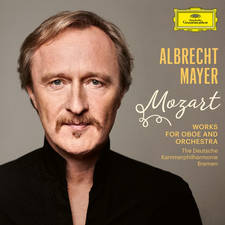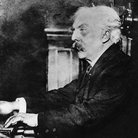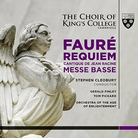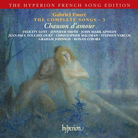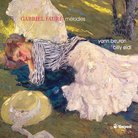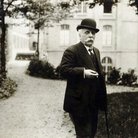Gabriel Fauré: A Life
By turns complex and uncomplicated, both his life and his music were full of fascinating contradictions. Fauré's music epitomises the very essence of French culture. His distinctive harmonies can be savoured like an exotic liqueur, yet there is an intellectual reserve that prevents full intoxication.
His melodies are stylish and elegant, chic even, etched with a sleight-of-hand urbanity. His music flows effortlessly, magically combining Monet’s liquid cool with the warmth of a Pisarro landscape, and somehow manages to be beguilingly sensual and nobly restrained at the same time.
The key to music can often be found in its composer, so it comes as no surprise to learn that Fauré was a meticulous, emotionally reserved figure of exquisite taste. He insisted that his music should be played “absolutely straight” for his immaculately crafted scores to achieve their maximum effect.
His late pieces, in particular, demonstrate an elusive yet profound mastery that infinitely rewards the patient listener. Yet, despite his apparent austerity, Fauré was irresistibly attractive to women and they to him. As in all things, he appears to have conducted his various affairs with exceptional sensitivity for the parties involved.
His scrupulous fairness spills over into his musical criticism for the newspaper Le Figaro, where his judgments are as deeply considered, balanced and refined as his music.
For example, although he had little time for Italian opera, he fairly concluded that Puccini’s Madama Butterfly undeniably provided “a feast of pleasure for the listener”. Indeed, Aaron Copland’s remark about Fauré’s work possessing “all the earmarks of the French temperament: sensibility, impeccable manners, classic reserve”, could be applied to his life in general.
Fauré showed exceptional musical talent from an early age, yet his school-inspector father appears to have been oblivious to it, waiting until his son was nine before sending him to the École Niedermeyer in Paris, a school dedicated to maintaining the glories of traditional church music.
During the 11 years Fauré spent there, he developed into a burgeoning composer and mellifluous pianist with a tone of “liquid gold”. It was at this time that the 25-year-old Saint-Saëns took Fauré under his wing, helping to refine his technique – it was the beginning of a life-long friendship.
In 1865, the year Fauré left the school, he composed his ravishing choral miniature, Cantique De Jean Racine, which has risen over the last decade from almost total obscurity to become a great favourite with Classic FM listeners.
Fauré then accepted the post of organist at Saint-Sauveur church in Rennes – the first in a string of church appointments. Dismissed after four years for being “outlandishly dressed” in church, he returned to Paris in 1870 on the eve of the Franco-Prussian War and promptly abandoned composing in order to join the light infantry, serving as a messenger.
The following year, he helped set up the Société National de Musique, along with Franck, Chabrier, Lalo, Duparc and d’Indy, with the express aim of promoting new music in France.
From the goings-on at St Suplice in Paris, one can sense the charming rogue that lay behind Fauré’s reserved exterior. Soon after his appointment there, as assistant to Charles-Marie Widor (of Toccata fame), the two men would playfully toss ideas back and forth between the two organ consoles during services, a game of musical “dueling” executed with such breathtaking panache that the priests and congregation remained totally oblivious.
Away from the confines of the church, Fauré courted interest in his music via the famous salon of the celebrated Spanish contralto Pauline Viardot. Here he met and befriended several distinguished writers, including Gustave Flaubert, Ivan Turgenev and George Sand (Chopin’s ex-mistress, real name Aurore Dudevant).
Fauré became infatuated with Viardot’s daughter, Marianne, who, after a series of hiatuses, broke off their engagement. This dealt the sensitive Fauré an emotional blow from which he took years to recover. One can sense his grief all too readily in the heart-rending song Après Un Rêve (After a Dream), and the impassioned Elégie for cello and orchestra, both composed in the wake of the break-up.
Despite producing music of such distinction, Fauré was still largely dependent on the church for a living, along with a paltry income from giving piano and harmony lessons. He was appointed choirmaster at the fashionable Madeleine Church in 1877, where he stayed with the “geese” (Fauré’s fond nickname for the choir’s boy trebles and altos), for nearly 20 years. Because of his time-consuming duties, composing became a luxury reserved for summer vacations.
Given his good looks, exceptional charm and physical grace (he was known affectionately as “the cat” by his friends), it was inevitable that Fauré would eventually marry, especially as contemporary Parisian society expected all men to have tied the knot by the age of 40.
Accordingly, in 1883, Fauré wed Marie Fremiet, daughter of the renowned sculptor, Emmanuel. It was a conventional relationship rather than an especially loving one, exacerbated by Fauré’s infidelities and the fact that Marie was effectively sidelined by his talent. By the end of the century, their marriage was based largely upon written correspondence rather than physical intimacy.
Meanwhile, Fauré’s music was achieving a new level of mastery, climaxing in the Requiem, a radiant masterwork that fully confirms the composer’s unshakeable belief in the afterlife, following the recent deaths of his parents.
He described death as “a happy deliverance, an aspiration towards happiness above, rather than a painful experience”, and the Requiem encapsulates this feeling in a way that continues to hold audiences spellbound.
Money from composition was still in short supply, although help was just around the corner in the form of Winnaretta Singer (of the famous sewing-machine company), who henceforth commissioned new works from him, as well as offering financial support.
By this time, Fauré was already enjoying an affair with Emma Bardac (who later married Debussy); her charming daughter, Hélène, was probably his. Fauré affectionately nicknamed her “Dolly’” due to her petite stature, and composed the enchanting two-piano Dolly Suite for her.
Fauré turned 50 in 1895, respected and well known amongst the cognoscenti, but hardly a world-class figure. Then, quite unexpectedly, everything began to fall into place.
The following year he was appointed both first organist at the Madeleine Church (second only to Notre Dame) and professor of composition at the Paris Conservatoire.
Nine years later he ascended to the dizzy heights of director, in the wake of the public scandal that erupted over Ravel’s ignominious dismissal from the early rounds of the Prix de Rome. Meanwhile, in 1900, Fauré had met 24-year-old Marguerite Hasselmans, a brilliant pianist and highly intelligent woman, who remained his mistress and constant companion to the end of his days.
Fauré now took responsibility for a remarkable series of brilliant pupils who included Ravel, Roger-Ducasse (reportedly his favourite), Schmitt, Cortot, Koechlin, Enesco and Nadia Boulanger, all of whom would remember his enlightened style of pedagogy with great respect and affection.
“I’m not biased in favour of any school,” he averred, “and there is no type of music I’m inclined to ban, provided it is the outcome of a sincere and well-founded point of view.”
Yet the wheel of fate had one more turn to make. Like Schumann half a century before, from around 1902 Fauré began to lose his hearing, aggravated by disturbing aural hallucinations.
Maintaining his dignity, he made sure that few of his friends and colleagues were aware of the problem until, in 1920, he was forced to give up his post at the Conservatoire. Fauré continued to compose music of exquisite poise, including the Piano Trio, song cycle L’horizon Chimérique, and the String Quartet, written in 1924, the year of his death from pneumonia.
“Fauré exposes in his later works a lean, muscular figure,” wrote the French music expert Martin Cooper, “slight in build but perfectly proportioned”.
Fauré himself appears to have remained philosophical right to the end. The day before he died he announced to his family: “I have done what I could, so God be my judge.”
